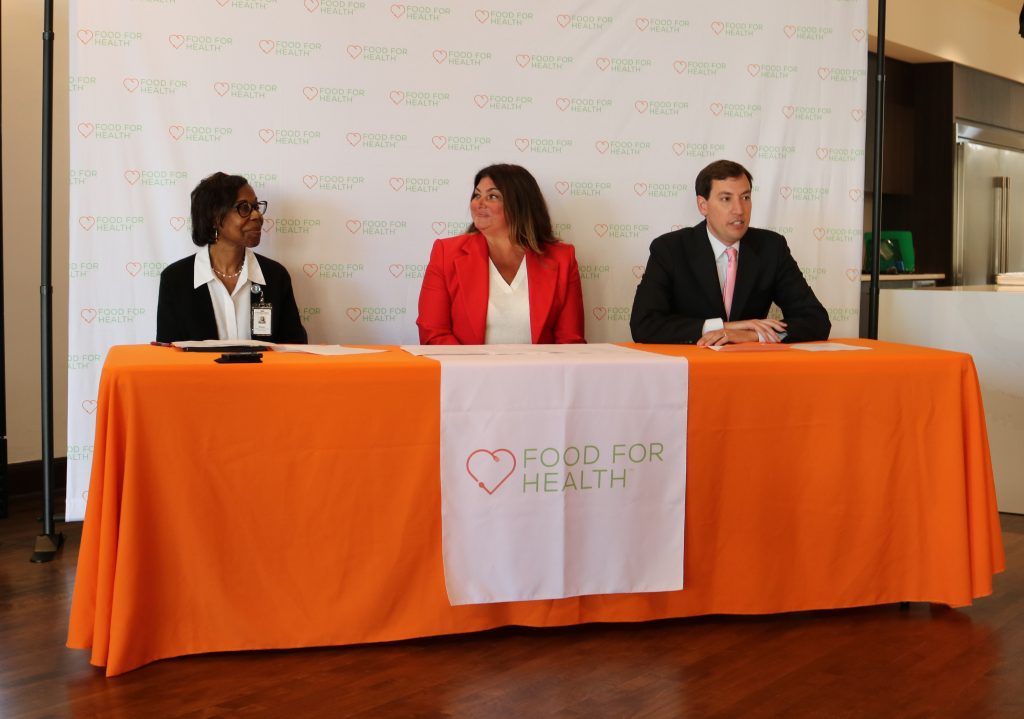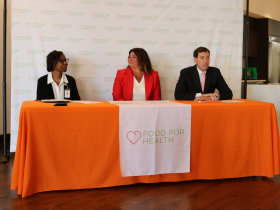Pilot Program Aims To Lower Infant Mortality Rates Through Healthy Food
New program provides medically-tailored meals to high-risk prenatal patients in Milwaukee.

Donna Whitson-Jones (right), Kathy Koshgarian and Dr. Jesse Ehrenfeld at a Sept. 14 press conference. Photo taken Sept. 14, 2023 by Sophie Bolich.
Two community-based organizations are joining forces on a healthy meal delivery system aimed at improving health outcomes for mothers and infants in Milwaukee.
Progressive Community Health Centers (PCHC) and Food For Health recently introduced a joint program that will provide healthy meals, nutrition guidance and wellness support to nearly 120 high-risk prenatal patients in Milwaukee, with the intent of lowering infant mortality rates.
Representatives from both organizations appeared at FFH’s Bronzeville headquarters, 2007 N. Martin Luther King Jr. Dr., for a Sept. 14 press conference, held in conjunction with National Food is Medicine Day, to discuss the new program.
“We’re very excited to share with you how Food For Health is taking action on nutrition and food insecurity for those with the most vulnerable health needs,” said Kathy Koshgarian, CEO and president of FFH, which got its start under The Dohmen Company Foundation and now operates as a separate 501(c)(3).
The program, she said, aims to address “nutritional disparities” while “creating equitable access to healthy and happy lives through the power of food.”
The effort is funded by a $500,000 grant from Advancing A Healthier Wisconsin Endowment as part of its latest round of community-led projects with monetary support through American Rescue Plan dollars.
During the nearly year-long program, participants will receive 10 weekly meals tailored to fit their medical needs, whether specific to diabetes, hypertension or other diseases. The dietician-approved meals are prepared by professional chefs, packaged and delivered to patients’ homes on a weekly basis.
Meals from the organization center on plant-based dishes and whole food ingredients. Beyond that, they look and taste good, said Dr. Jesse Ehrenfeld, endowment director for Advancing A Healthier Wisconsin.
“These are not Pick ‘n Save meals,” he said. “No, these are beautifully crafted, delicious meals that any of you would be proud to serve. And I think that’s something that’s really important about this program, when you think about the community and supporting the dignity of the women who are engaged in this.”
The program also provides personalized wellness coaching and nutrition education, reading materials and community classes, along with biometric assessments to monitor program results.
Milwaukee has historically reported elevated rates of infant mortality. Between 2017 and 2018, Milwaukee’s infant mortality rate was higher than other large cities with similar demographics, according to a 2021 report. The same study found that preterm delivery accounted for almost half of all infant deaths and 52% of Black infant deaths in Milwaukee County.
Further, Data collected between 2014 and 2020 indicates that 11% of all Milwaukee County births and 16% of births to Black women were low birthweight, compared to 8% of statewide births.
Pregnant people who are considered high-risk due to type 2 diabetes, acquired gestational diabetes, hypertension, obesity, preeclampsia and other diet-related conditions are more likely to experience adverse outcomes including preterm delivery and low birth weight. That is a concern for the approximately 75% of prenatal patients at PCHC who are considered high-risk. Racial, ethnic, and socioeconomic disparities worsen these issues.
And while PCHC provides culturally-sensitive prenatal and postnatal maternity care, health care is just one aspect of ensuring healthy pregnancies and births, said Dr. Allison Kos, chief medical officer for PCHC. “Through this joint effort we are committed to clearly demonstrating that equitable access to medically-tailored food and personalized programming can improve maternal health outcomes,” she said.
Koshgarian said the program’s long-term mission is to create lifelong positive change — not just for mothers and infants, but for entire families.
“Our goal is to help PCHC patients manage and even reverse the negative impact of diet-related diseases and improve the delta for women of color regarding maternal health in Wisconsin,” she said.
Food For Health is a member of the National Food as Medicine Coalition and is the first and only verified provider for medically-tailored meals in Wisconsin.
If the program is successful, Koshgarian said she hopes it can serve as a pilot for larger-scale projects.
Update: A previous version of this story stated that Food For Health operates under The Dohmen Company Foundation.
Photos
If you think stories like this are important, become a member of Urban Milwaukee and help support real, independent journalism. Plus you get some cool added benefits.
























